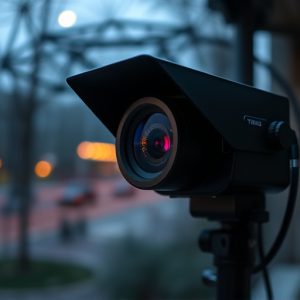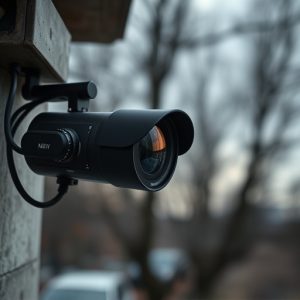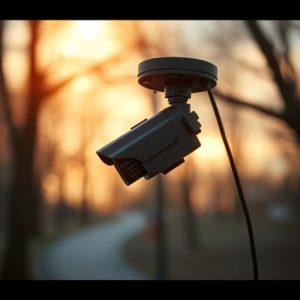Unveiling Hidden Threats: Spy Equipment Detection via Mobile Apps
Spy equipment disguised as everyday items, like clocks or toys, has advanced with features such as n…….
Spy equipment disguised as everyday items, like clocks or toys, has advanced with features such as night vision, motion sensors, and two-way audio, raising privacy concerns. Mobile apps leveraging image recognition and motion detection algorithms help parents detect hidden cameras for babysitter monitoring, but this practice raises ethical issues and privacy risks. Balancing parental surveillance rights with individual autonomy and data protection is a complex task due to the use of concealed cameras in childcare.
In an era where technology advances rapidly, so do concerns over privacy and security. One emerging threat is the use of hidden spy equipment, such as concealed cameras, in domestic settings like homes and even nurseries. This article delves into the world of spy equipment detection using mobile apps, focusing on their effectiveness against concealed cameras commonly used for babysitter monitoring. We’ll explore the technology behind these apps, address ethical considerations, and discuss privacy concerns associated with this modern-day dilemma.
- Understanding Spy Equipment and Their Common Uses
- The Role of Mobile Apps in Detecting Concealed Cameras
- Ethical Considerations and Privacy Concerns with Babysitter Monitoring Apps
Understanding Spy Equipment and Their Common Uses
Spy equipment, often disguised as everyday items, has evolved to include a range of devices designed for surveillance and monitoring. From hidden cameras to advanced listening devices, these tools can be used for both legitimate purposes, such as home security or parental control, as well as malicious intentions like invasion of privacy. One common application is the use of concealed cameras for babysitter monitoring, where parents employ hidden devices to ensure their children’s safety while in the care of a babysitter.
These spy gadgets can be tiny and easily portable, fitting into everyday objects like clocks, pens, or even toys. They often come equipped with features like night vision, motion sensors, and two-way audio, making them versatile tools for surveillance. While their legality varies across regions, the growing availability of these devices raises important privacy concerns, especially when used without consent. Understanding the capabilities and potential misuse of spy equipment is crucial for both consumers and legal authorities in navigating this evolving landscape.
The Role of Mobile Apps in Detecting Concealed Cameras
In today’s digital era, mobile apps have emerged as powerful tools in detecting concealed cameras, especially when it comes to babysitter monitoring. These applications utilize advanced technologies like image recognition and motion detection algorithms to scan for any suspicious devices or hidden cameras within a given area. By seamlessly integrating with smartphones, these apps allow parents to ensure their children’s safety while at home by identifying potential threats from covert surveillance equipment.
The ability to detect concealed cameras is particularly relevant in scenarios where privacy and security are paramount, such as hiring babysitters. Mobile apps designed for this purpose offer a convenient and discreet solution, enabling parents to monitor activities without raising unnecessary alarm. This technology leverages the widespread adoption of smartphones, making it accessible and efficient for safeguarding homes and families from unwanted intrusions.
Ethical Considerations and Privacy Concerns with Babysitter Monitoring Apps
The use of mobile apps for babysitter monitoring, often equipped with features to detect concealed cameras, raises significant ethical considerations and privacy concerns. While these apps aim to provide parents with peace of mind by offering remote surveillance capabilities, they also infringe upon the privacy and autonomy of individuals, especially when used without their knowledge or consent. The deployment of hidden cameras for babysitter monitoring blurs the line between safety and surveillance, potentially leading to a chilling effect on civil liberties.
In many cases, these apps collect and store sensitive data, including video footage and audio recordings, which can be vulnerable to hacking or unauthorized access. This poses risks not just to the privacy of babysitters but also to that of children in their care, as any breach could expose personal information and create a dangerous precedent. Balancing parental rights to monitor childcare with the right to privacy is a delicate task, especially given the prevalence of hidden cameras for babysitter monitoring, which raises important questions about consent, data security, and the potential for misuse.
Modern technology, particularly mobile apps, has introduced innovative solutions for spy equipment detection, especially in scenarios like babysitter monitoring. While these apps offer convenience and peace of mind, it’s crucial to balance the benefits against potential privacy invasions. As we’ve discussed, hidden cameras are a legitimate concern, but with awareness and responsible app usage, individuals can protect their personal spaces. When considering apps for babysitter monitoring or any form of surveillance, understanding the capabilities and limitations is essential to ensure a safe and ethical digital environment.


